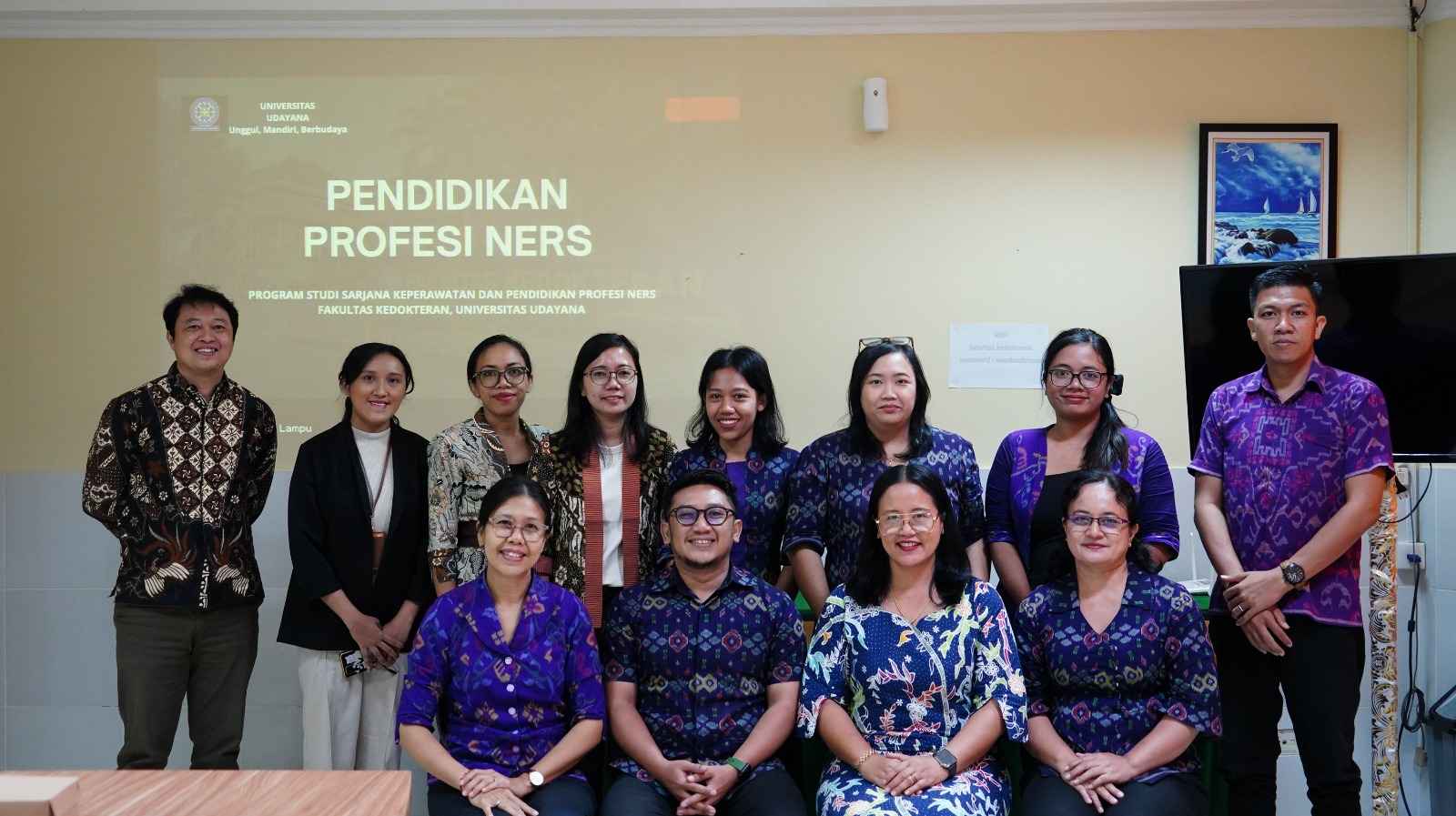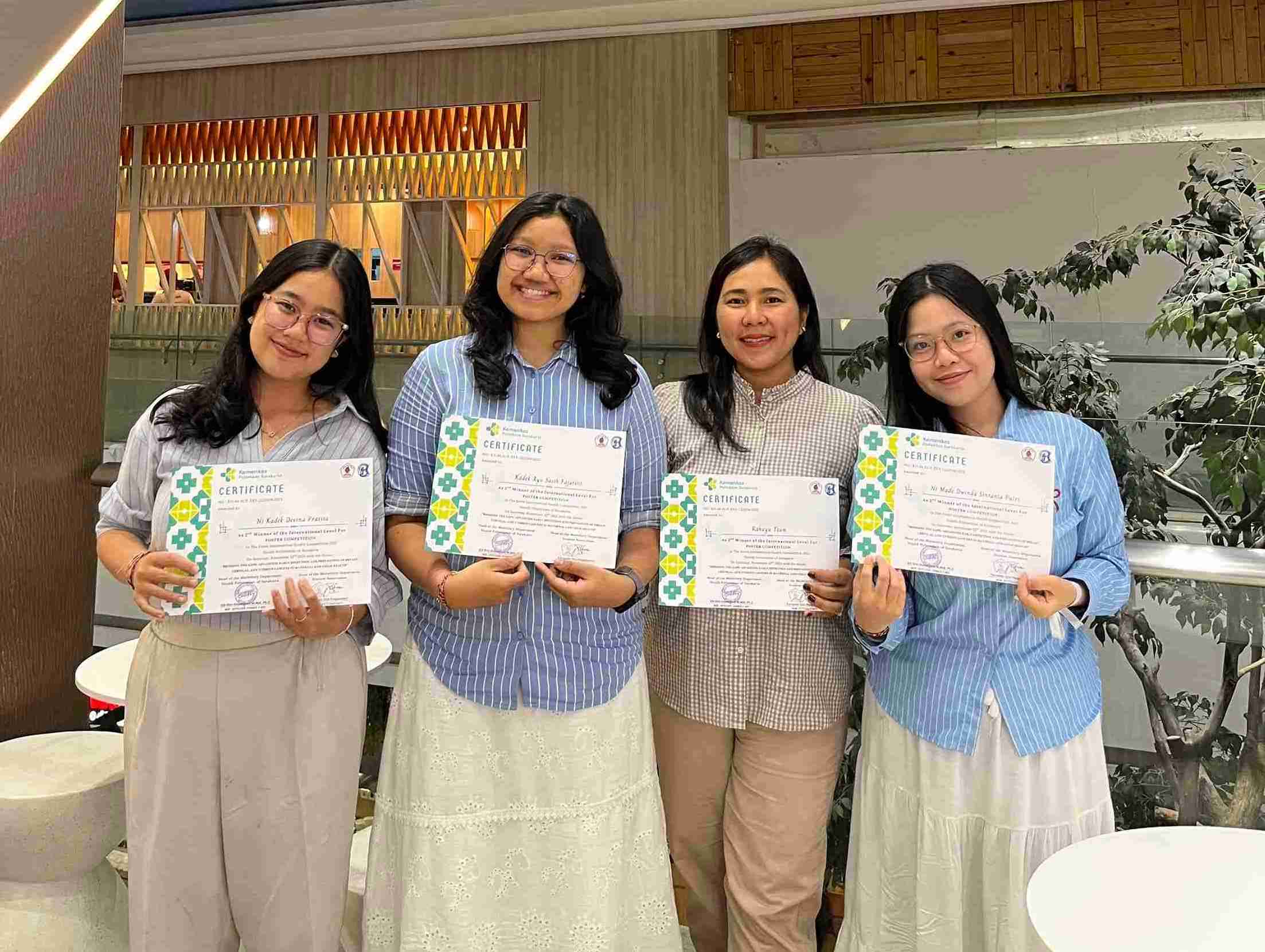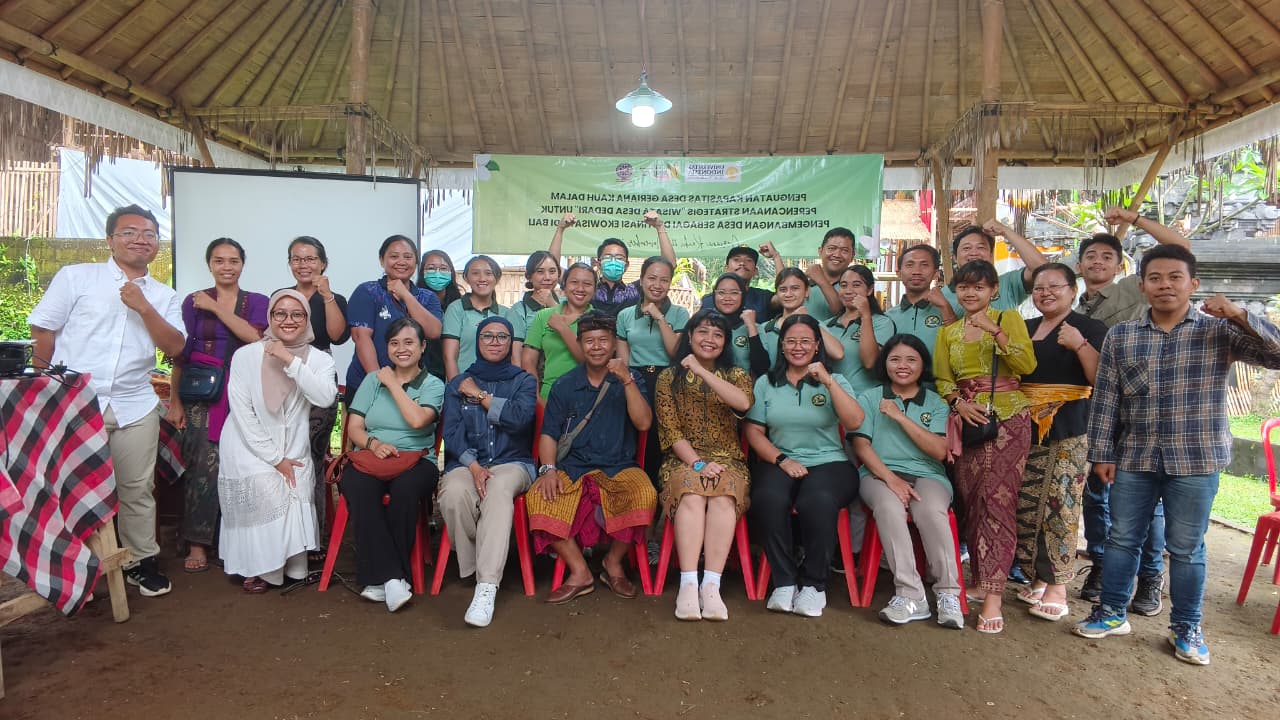Nursing Profession Degree
The Professional Stage Learning Program is a series of clinical learning processes undertaken by students after completing a Bachelor’s degree in nursing (S.Kep). This learning program is carried out in various practice settings, including network facilities and skill labs, and must comply with the regulations set out in the nursing profession guidelines during its implementation.
To participate in the Professional Stage Learning Program at PSSIKPN FK Unud, students must meet the following requirements:
Academic Requirements:
- Possess a Bachelor’s degree in Nursing (S1 Keperawatan).
- Minimum cumulative grade point average (GPA) of 2.7 in the Bachelor’s in Nursing program.
- Only accepts graduates from PSSIKPN FK Unud.
Administrative Requirements:
- Register online at the website https://e-registrasi.unud.ac.id.
- Complete payment for education costs (UKT).
- Fill out the Study Plan Card (KRS) online at https://imissu.unud.ac.id.
- Complete and sign a statement of willingness to participate in the nursing profession program.
- Submit a photocopy of a valid Basic Life Support (BHD) certificate.
- Submit a photocopy of active health insurance membership proof.
PROFESSIONAL EDUCATION GOALS
The professional education stage is more focused on developing the profile of care providers, communicators, educators (health promoters), and managers. The goal of the professional stage education is to prepare students through professional adaptation in the form of comprehensive clinical learning and field experiences, so they can achieve the following professional capabilities:
- Apply concepts, theories, and principles from social behavioral sciences, biomedical sciences, and nursing in providing nursing care to individuals, families, communities, and society.
- Provide nursing services and care, from simple to complex problems, thoroughly through assessment, diagnosis determination, care planning, implementation, and evaluation, whether promotive, preventive, curative, or rehabilitative, within the scope of authority, responsibility, and competence, and based on nursing ethics.
- Systematically document all nursing processes and utilize them to improve the quality of nursing care.
- Manage basic-level nursing services responsibly while demonstrating leadership skills.
PRACTICE SETTING CRITERIA
If the pandemic ends and in-person learning is allowed, students will undergo duty in various practice settings based on the competency targets they need to achieve. The practice settings used for professional practice are those that meet the following criteria:
- Align with the purpose of the practice.
- Provide opportunities for students to have client contact.
- Have competent clinical supervisors in their respective fields.
- Provide opportunities for students to learn a variety of skills.
- Stimulate critical thinking skills in students.
- Use concepts/methods in assignments that align with nursing concepts.
The following are the names of places for clinical nursing skills development for each subject:
- RSUP SANGLAH: for competency in Basic Professional Nursing, Medical-Surgical Nursing, Pediatric Nursing, Emergency and Critical Care Nursing, and Maternity Nursing.
- RSUP JIWA BANGLI: for competency in Mental Health Nursing.
- RS Universitas Udayana: for competency in Nursing Management.
- PUSKESMAS in Denpasar City: for competency in Community and Family Nursing, Gerontological Nursing, Pediatric Nursing, and Mental Health Nursing.
- PANTI SOSIAL TRESNA WERDA: for competency in Gerontological Nursing.
SUPERVISOR CRITERIA
Students will be guided by Clinical Instructors (CI) and Clinical Teachers (CT). The expected criteria for CI and CT are:
- Experienced and/or expert in their field.
- Educated with at least a Bachelor’s degree in Nursing.
- Have a good reputation in knowledge, skills, and attitude.
- Have attended perceptorship training.
- CT must have an official assignment letter from the university, while CI must have an official assignment letter from the practice setting.
COMPETENCIES TO BE ACHIEVED BY STUDENTS
The competencies to be achieved by students in the professional stage include:
- Conducting effective communication.
- Assisting in health education activities.
- Managing nursing administration.
- Actively participating as a team member.
- Applying ethical and legal aspects in nursing practice.
- Providing professional nursing care in clinical settings and communities using a nursing process approach centered on the patient and ensuring patient safety.
- Providing culturally sensitive care by respecting the ethnic, religious, or other unique factors of each patient.
- Applying leadership and nursing management skills.
- Developing interpersonal relationships.
- Continuously developing professionalism.
At the end of the professional stage learning process, students are expected to demonstrate the competencies described in the following competency units:
- Conducting effective communication in providing care.
- Applying knowledge, ethical, and legal frameworks in the health system related to nursing.
- Making ethical decisions.
- Providing culturally sensitive care by respecting the ethnic, religious, or other unique factors of each patient.
- Ensuring continuous and consistent holistic care quality.
- Effectively utilizing health technology and information.
- Applying the nursing process to solve client problems.
- Advocating for clients to defend their rights in decision-making.
- Demonstrating technical nursing skills according to standard operating procedures (SOP).
- Collaborating in various aspects of meeting clients' health needs.
- Providing necessary therapeutic modalities.
- Maintaining a safe environment consistently through strategies to ensure quality and manage risks.
- Providing health services according to applicable policies in the health field.
- Collaborating in nursing service activities.
- Supporting the care team while maintaining accountability for the nursing care provided.
- Using effective interpersonal skills in team work and providing nursing care while maintaining collaborative relationships.
- Utilizing research findings to improve the quality of nursing care.
- Developing critical, logical, and ethical thinking in nursing care development.
- Keeping up with developments in nursing and health sciences.
- Contributing to the development of the nursing profession.



FACULTY OF MEDICINE UDAYANA UNIVERSITY